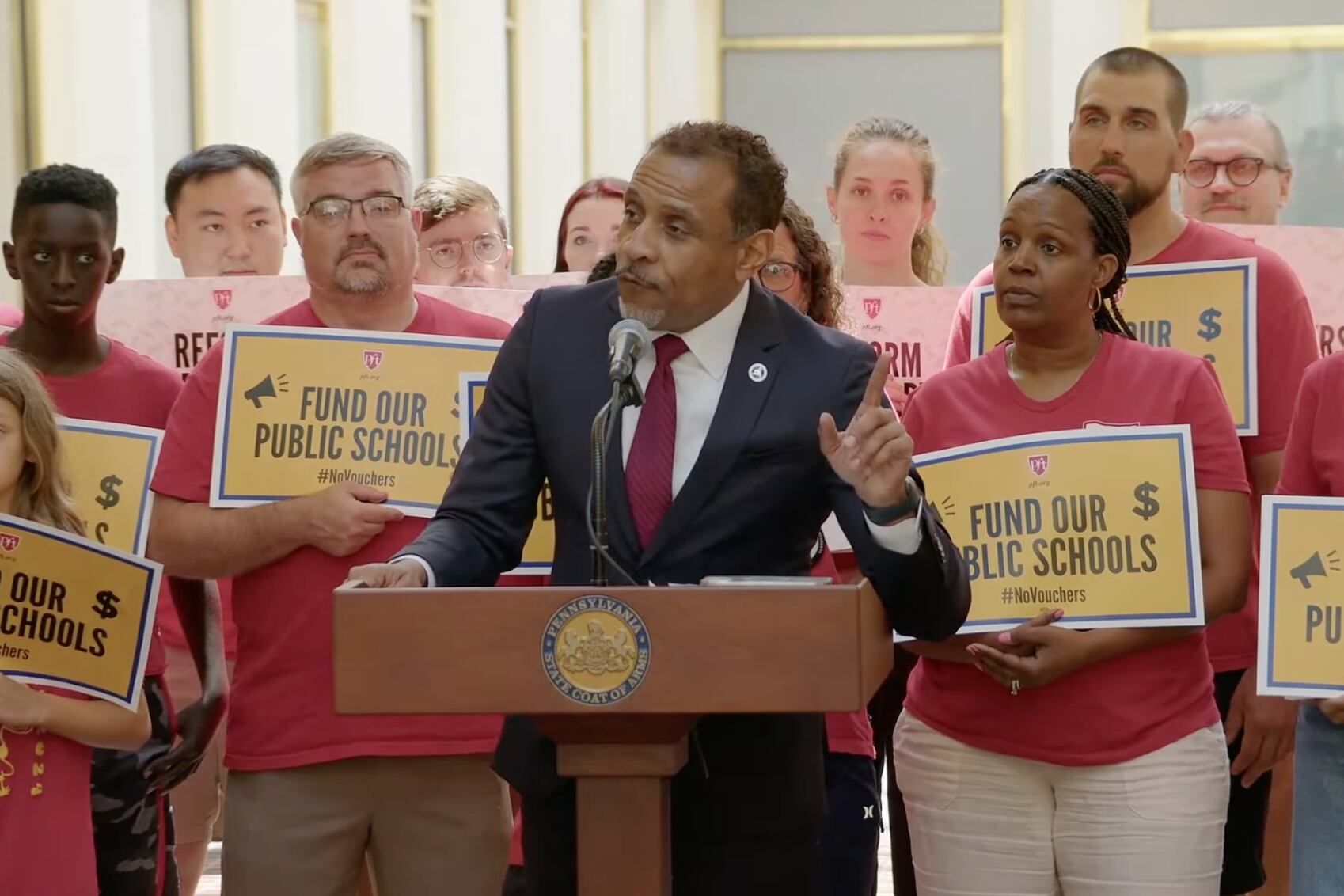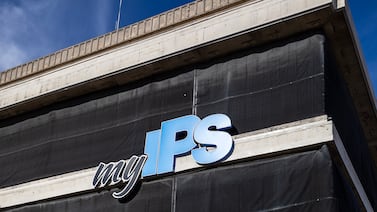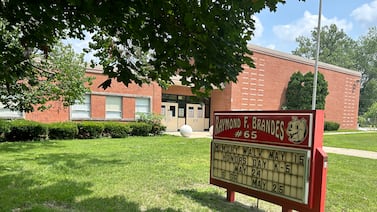Sign up for Chalkbeat Philadelphia’s free newsletter to keep up with the city’s public school system.
In an unusual show of unity, Philadelphia school officials and union leaders stood side by side at the state Capitol in Harrisburg on Wednesday to call on state lawmakers to increase funding for city schools in the upcoming state budget.
They said that more money for the district would help it continue to support students, improve graduation rates and test scores, and save the government money down the road.
State lawmakers have until June 30 to pass next year’s state budget, though some have signaled they are unlikely to meet that deadline. School funding has been an ongoing flashpoint in negotiations following a 2023 court ruling that found the state’s previous school funding formula to be unconstitutional because it left poor districts severely underfunded.
Philadelphia schools got $232 million more in last year’s budget, though it still left the district with far less money per pupil than wealthier suburban districts. Democratic lawmakers argue the court ruling means the state must continue to increase funding for districts like Philadelphia that cannot or do not have resources to raise as much money through property taxes.
Some Republicans have previously resisted increasing funding for poor districts, promoting additional school choice programs like vouchers instead.
“This is no ordinary year,” said LeShawna Coleman, chief of staff of the Philadelphia Federation of Teachers, referring to the 2023 court ruling as well as growing concerns that the Trump administration could cut federal funding for schools.
“We’re doing this to make sure Philly public schools get their fair share of funding,” Coleman added. “Our students deserve nothing less.”
Union leaders appearing alongside district officials to lobby lawmakers together is “unprecedented,” PFT President Arthur Steinberg said Wednesday.
Their trip to Harrisburg comes days after a majority of union members voted to authorize a strike amid ongoing contract negotiations. Teacher salaries and benefits make up the largest portion of the district’s budget, so any additional state funding would likely go in part to employee salaries.
Both union leaders and district officials said they supported Democratic Gov. Josh Shapiro’s budget proposal, which would increase funding for Philadelphia schools by more than $200 million.
Shapiro’s proposal includes additional funding for building repairs, school meals, student mental health support, and special education. It would also limit how cyber charter schools are funded in a way that would save the district another $50 million.
Board President Reginald Streater said increased funding would help the district maintain some of its academic gains and continue to better serve students. Last school year, the district’s attendance increased slightly, its dropout rate declined, and some student test scores increased.
“Without a continued investment, we risk stalling or even reversing the momentum we have all worked so hard to build,” said Streater.
Lawmakers battle over funding for Philadelphia schools
After the 2023 court ruling that found the state inequitably funded school districts, enabling those with large tax bases to thrive while others in poorer areas struggled, lawmakers negotiated how to close the gap.
A commission convened by lawmakers in 2023 to examine the issue ultimately defined a concept called an “adequacy target.” It measures how much money districts need to serve their students, with considerations that poor students, English language learners, and students with disabilities may need more resources.
But last year’s state budget left the Philadelphia school district with a $4.5 billion “adequacy gap”.
Several Democratic lawmakers joined the rally Wednesday, voicing their commitment to eliminating that disparity. Democratic Sen. Vincent Hughes, who represents part of Philadelphia, said the 2023 court ruling essentially requires as much.
“If the judge says, ‘You gotta do something,’ you gotta do it,” said Hughes. “What we’re saying is fund the schools.”
However, some Republican lawmakers have previously disagreed with that interpretation of the court ruling. In March, Senate Majority Leader Joe Pittman, a Republican, noted the court did not specifically require the state to increase funding to certain districts and questioned the fairness of the state’s adequacy funding formula.
Philadelphia schools Superintendent Tony Watlington said his plan is to steward the district’s funding to ensure students graduate prepared and do not have to rely on other costly government programs, like social services, down the line.
“We are committed to ensuring that we come back and report to you, year over year, the return on investment for every dollar you send to the school district of Philadelphia,” said Watlington.
Lawmakers eye changes to cyber charter funding
Union representatives and school officials also rallied for lawmakers to save the Philadelphia district money through legislation that would cap the amount districts pay cyber charter schools.
The bill, which could save school districts across the state more than $600 million annually, passed the state House earlier this month. It now awaits consideration in the Senate, which is controlled by Republicans, who have largely been more supportive of alternatives to traditional public schools, like cyber charters.
“We have invested in cyber charter schools and gotten nothing in return,” said Rep. Mary Isaacson, a Philadelphia Democrat and the bill’s main sponsor in the House. “Except children that are not being educated and children that are falling behind.”
Cyber charter schools are currently funded with the same formula as brick-and-mortar charters. As more cyber charters have opened in Pennsylvania in recent years, some lawmakers and advocates worry that they receive surplus funding as they do not have the same building maintenance needs as traditional schools.
Cyber charter schools have performed worse than the state average, with lower graduation rates and lower test scores in some subjects.
Isaacson’s bill would also introduce additional oversight for cyber charter schools and require them to pay back some of the money from the past school year that they did not spend.
Though the bill has been championed by Democrats, it has some support from Republicans.
Rebecca Redelmeier is a reporter at Chalkbeat Philadelphia. She writes about public schools, early childhood education, and issues that impact students, families, and educators across Philadelphia. Contact Rebecca at rredelmeier@chalkbeat.org.






